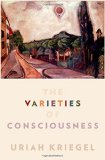April 26, 2015

Consciousness, Attention, and Conscious Attention by Carlos Montemayor and Harry Haladjian (MIT Press, 2015)
(amazon.co.uk)
Book description from the publisher:
In this book, Carlos Montemayor and Harry Haladjian consider the relationship between consciousness and attention. The cognitive mechanism of attention has often been compared to consciousness, because attention and consciousness appear to share similar qualities. But, Montemayor and Haladjian point out, attention is defined functionally, whereas consciousness is generally defined in terms of its phenomenal character without a clear functional purpose. They offer new insights and proposals about how best to understand and study the relationship between consciousness and attention by examining their functional aspects. The book’s ultimate conclusion is that consciousness and attention are largely dissociated.
Undertaking a rigorous analysis of current empirical and theoretical work on attention and consciousness, Montemayor and Haladjian propose a spectrum of dissociation — a framework that identifies the levels of dissociation between consciousness and attention — ranging from identity to full dissociation. They argue that conscious attention, the focusing of attention on the contents of awareness, is constituted by overlapping but distinct processes of consciousness and attention. Conscious attention, they claim, evolved after the basic forms of attention, increasing access to the richest kinds of cognitive contents.
Montemayor and Haladjian’s goal is to help unify the study of consciousness and attention across the disciplines. A focused examination of conscious attention will, they believe, enable theoretical progress that will further our understanding of the human mind.
Google Books preview:
Comments (0)
- consciousness,new books

Talking to Our Selves: Reflection, Ignorance, and Agency by John M. Doris (Oxford University Press, 2015)
(kindle ed.), (amazon.co.uk), (UK kindle ed.)
Book description from the publisher:
The unconscious, according to contemporary psychology, determines much of our lives: very often, we don’t know why we do what we do, or even exactly what we are doing. This realization undermines the philosophical-and common sense-picture of human beings as rational, responsible, agents whose behavior is ordered by their deliberations and decisions. Drawing on the latest scientific psychology and philosophical ethics, Talking to Our Selves develops a philosophically viable theory of agency and moral responsibility that fully accounts for the unsettling challenges posed by the sciences of mind.
Google Books preview:
See also: Author’s website
Comments (0)
- new books,psychology
April 20, 2015

The Varieties of Consciousness (Philosophy of Mind Series) by Uriah Kriegel (Oxford University Press, 2015)
(amazon.co.uk)
Book description from the publisher:
Recent work on consciousness has featured a number of debates on the existence and character of controversial types of phenomenal experience. Perhaps the best-known is the debate over the existence of a sui generis, irreducible cognitive phenomenology – a phenomenology proper to thought. Another concerns the existence of a sui generis phenomenology of agency. Such debates bring up a more general question: how many types of sui generis, irreducible, basic, primitive phenomenology do we have to posit to just be able to describe the stream of consciousness? This book offers a first general attempt to answer this question in contemporary philosophy. It develops a unified framework for systematically addressing this question and applies it to six controversial types of phenomenal experience, namely, those associated with thought and judgment, will and agency, pure apprehension, emotion, moral thought and experience, and the experience of freedom.
Google Books preview:
See also: Author’s website, with book introduction
Comments (0)
- consciousness,new books
April 18, 2015

How Dante Can Save Your Life: The Life-Changing Wisdom of History’s Greatest Poem by Rod Dreher (Regan Arts, 2015)
(kindle ed.), (amazon.co.uk),
Book description from the publisher:
The opening lines of The Divine Comedy by Dante Alighieri launched Rod Dreher on a journey that rescued him from exile and saved his life. Dreher found that the medieval poem offered him a surprisingly practical way of solving modern problems.
Following the death of his little sister and the publication of his New York Times bestselling memoir The Little Way of Ruthie Leming, Dreher found himself living in the small community of Starhill, Louisiana where he grew up. But instead of the fellowship he hoped to find, he discovered that fault lines within his family had deepened. Dreher spiraled into depression and a stress-related autoimmune disease. Doctors told Dreher that if he didn’t find inner peace, he would destroy his health. Soon after, he came across The Divine Comedy in a bookstore and was enchanted by its first lines, which seemed to describe his own condition.
In the months that followed Dante helped Dreher understand the mistakes and mistaken beliefs that had torn him down and showed him that he had the power to change his life. Dreher knows firsthand the solace and strength that can be found in Dante’s great work, and distills its wisdom for those who are lost in the dark wood of depression, struggling with failure (or success), wrestling with a crisis of faith, alienated from their families or communities, or otherwise enduring the sense of exile that is the human condition.
Inspiring, revelatory, and packed with penetrating spiritual, moral, and psychological insights How Dante Can Save Your Life is a book for people, both religious and secular, who find themselves searching for meaning and healing. Dante told his patron that he wrote his poem to bring readers from misery to happiness. It worked for Rod Dreher. Dante saved Rod Dreher’s life—and in this book, Dreher shows you how Dante can save yours.
Google Books preview:
Comments (0)
- happiness,psychology






